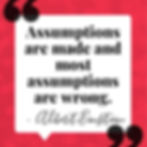Challenging Our Assumptions
- Tami Chapek
- Jul 7, 2019
- 3 min read

According to Albert Einstein, “Assumptions are made and most assumptions are wrong.” I can personally think of many other quotes about assumptions – and none are really positive. So why do we even allow assumptions to be part of our lives?
“We Do Not See Things as They Are, We See Things as We Are” – Anais Nin
Assumptions are defined as “a thing that is accepted as true or as certain to happen, without proof.” Simply put, assumptions are the filters that we look through to guide our decision-making processes. They are based on our histories, on the experiences that we’ve observed and are generally used as a way to help us feel confident in how we move forward. For many people, assumptions are unconscious thoughts that frame up our mindset and approach to life. For others, there is a level of conscious thought that goes into it, but the assumption is utilized as a way to protect them from future harm based on previous experiences.
Assumptions can show up in many ways. Assumptions are made when we walk into a room and observe a group talking. Assumptions are made when someone cuts us off in traffic. Assumptions are made when we walk down the street and see an individual who looks or sounds different than we do.
“Assumptions are Dangerous Things” – Agatha Christie
Assumptions can and do inhibit our ability to treat other people fairly and inhibit our ability to form greater relationships. When we make assumptions about someone, we place an inaccurate belief on them about who they are, what they can do, and how they behave. These inaccurate beliefs will hold us back from being fully connected to others, open to what beauty that individuals bring to the world, and limit our true potential to impact those around us positively. When we place assumptions on others, we hold ourselves back from our fullest potential.
“Before You Assume, Try Asking” - Unknown
Rather than let assumptions be the driver of our decisions, we need to challenge them to really validate what is true. So how do we do that?
First and foremost, we need to identify when we are making assumptions. Self-awareness and an understanding of when assumptions are coming up for you is the biggest part of being able to navigate this terrain effectively. I often suggest to my clients to journal or keep a log of times when they are making assumptions so that they can begin to identify when and how often it is happening.
As we become more and more aware of when we are making assumptions, we can then start to challenge those beliefs and assess how we really do want to proceed. One of my favorite questions to ask around assumptions is “how true is that”? Often, the answer to that is unknown or becomes clear that it is based on historical information, and not on that individual or current situation. Other questions to ask might include “where does this thought (or feeling) come from”, “what might be going on for the other person in that moment”, or “what are other possible reasons for this to be this way” to name a few.
“Assumptions are the Termites of Relationships” – Henry Winkler
As we challenge those beliefs and give ourselves the time and space to assess what is actually happening, we are able to look at individuals and at individual situations with a very different perspective and lens. This gives us the ability to treat others more fairly – and to remove bias and baggage that we have in a given situation to see it with a fresh perspective and approach. By removing this limited perspective, we are able to be more open and in tune to the world around us, giving us the ability to be greater leaders and connected individuals.
.png)